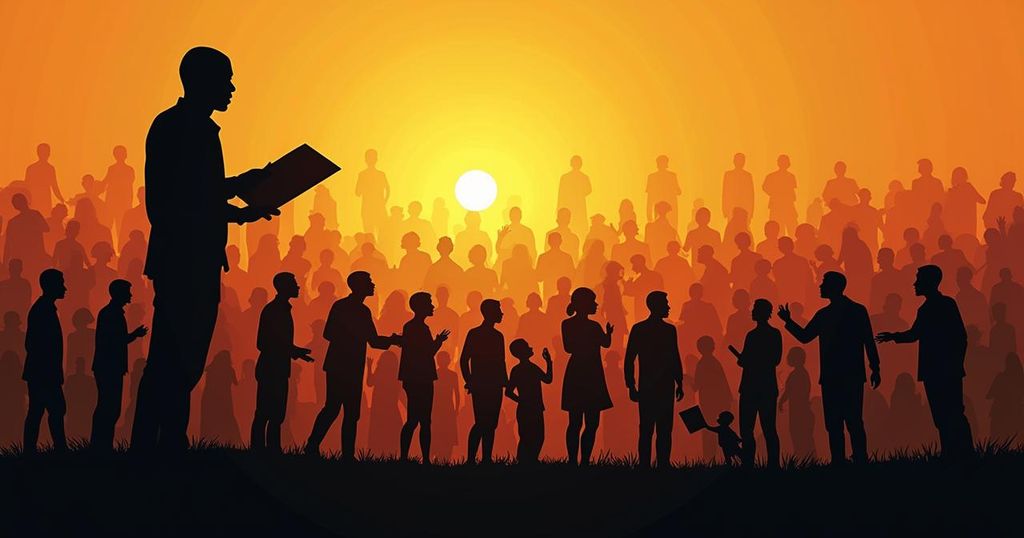Significant Elections in Mozambique: A Quest for Change and Stability

Mozambicans voted for a new president in an election expected to uphold Frelimo’s long-standing power. Outgoing President Filipe Nyusi voted early, emphasizing peace during the process. Presidential candidate Daniel Chapo, a novice by Frelimo’s historical standards, competes against several opponents. Challenges of poverty and insecurity loom large as the nation seeks economic recovery amid hope from a younger electorate. Vote counting starts at 18:00 local.
Mozambicans have participated in a significant general election aimed at selecting a new president, with the ruling Frelimo party—long dominant since gaining power in 1975—expected to continue its reign. The outgoing President Filipe Nyusi, who has reached his constitutional two-term limit, was among the first citizens to cast his vote when polls opened at 07:00 local time (05:00 GMT). This election features Frelimo’s presidential candidate Daniel Chapo, a 47-year-old relatively unknown individual until his recent nomination, who seeks to position himself as a catalyst for change. His opposition consists of independent candidate Venâncio Mondlane, Ossufo Momade—former rebel leader of the Renamo party—and Lutero Simango from the Mozambique Democratic Movement (MDM). This election is notably historic as, for the first time, the Frelimo candidate did not have direct involvement in the country’s independence war. Chapo, born two years post-independence, is viewed by many as untainted by the party’s history of corruption scandals. After voting in Maputo, where early voters contended with rain, President Nyusi encouraged the populace to remain patient during the electoral process. He emphasized, “I would also ask that no group of citizens agitates or threatens others, that everything happens in peace and tranquillity and that we avoid announcing the results ahead of time,” as reported by the AFP news agency. With over 16 million voters registered, there exists a palpable sense of hope among the youth. A 22-year-old student articulated this sentiment, stating, “I feel hopeful… People my age are worried about the future of our country, so I think they will vote,” according to Reuters. Moving forward, analysts note that the forthcoming president will face considerable challenges, primarily regarding the creation of economic opportunities amidst persistent poverty that affects 62% of the population, living on less than $1.90 per day. Mozambique has also been grappling with the repercussions of a civil war that concluded in 1992, and hopes for economic uplift from newly discovered gas deposits in the north have been hampered by an Islamist insurgency that erupted in Cabo Delgado province in 2017. Although troops from Rwanda and South Africa have been deployed to quell the insurgents, progress on lucrative liquefied natural gas projects remains stalled. The counting of votes will commence post-closure of the polls at 18:00 local time, with official results expected to be announced in approximately two weeks.
The backdrop of this election is pivotal, given Mozambique’s long history with the Frelimo party, which has maintained control since the country achieved independence from Portuguese rule in 1975. The transition of leadership with President Nyusi stepping down after two terms marks a crucial juncture, particularly as it is the first time a candidate from Frelimo has not directly participated in the liberation struggle. The political dynamics also reflect broader socioeconomic challenges, including rampant poverty and the impact of a protracted civil conflict. The hope for revitalization through resource exploitation has been significantly challenged by ongoing security concerns in the northern region, underlining the delicate balance of political stability and economic development.
In summary, Mozambique’s critical election symbolizes a potential shift in leadership within a long-standing ruling party context, with pressing economic and social challenges looming before the next president. The candidates’ approaches to addressing poverty and the security issues related to the Islamist insurgency will likely define the country’s future trajectory. As the elections unfold, the sentiments of young voters indicate a yearning for change and hope for a better future.
Original Source: www.bbc.com







